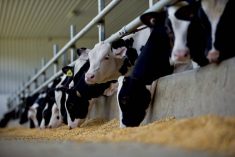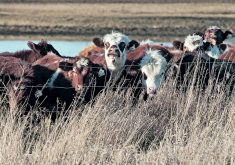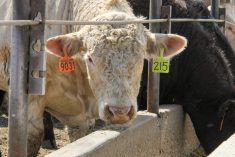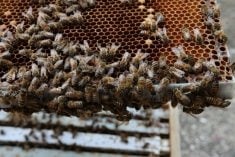Federal inspectors have confirmed a southeastern Alberta cow found with bovine tuberculosis in September was not just a one-off.
The Canadian Food Inspection Agency on Friday reported five more cattle from the initial cow’s index herd in southeastern Alberta are confirmed to have been infected with Mycobacterium tuberculosis bacteria — presumed to be to be M. bovis, the bacterium that causes bovine TB.
The five animals were discovered during the removal and destruction of the initial cow’s index herd, in which 52 animals so far showed “a response to initial testing.”
Read Also

Mexico agriculture secretary says still no date for restarting cattle exports to U.S.
Mexican Agriculture Minister Julio Berdegue said on Wednesday that Mexico and the United States have not yet set a date to resume Mexican cattle exports amid an outbreak of the flesh-eating screwworm parasite.
Of those 52, 12 were found in post-mortem exams to have lesions “compatible” with bovine TB; of those 12, five have been confirmed with the bacteria. The source of infection in the affected cattle is still unknown.
“These positive test results indicate transmission between animals has occurred,” the agency said in a statement Friday, adding it’s now running a risk assessment “to determine how these results impact the investigation and whether or not additional herds may be declared infected.”
The bovine TB probe follows a notice in late September from the U.S. Department of Agriculture that a cow from Alberta had tested positive for the disease at a U.S. packing plant.
All cattle from the index herd — which lives on three separate premises in the area — are in the process of being removed from the premises and humanely destroyed, the agency said Friday.
While the index herd is the only one so far to turn up infected cows, federal quarantines remain in place on “approximately” 34 farms in Alberta and two in southwestern Saskatchewan, CFIA reiterated Friday.
No cases of bovine TB have been confirmed in Saskatchewan, the agency said, but the animals on the quarantined farms in that province have been “in contact” with the infected herd, thus are “subject to movement controls.”
The increase in the number of infected animals from this case has no effect on food safety, the agency said, as all animals are examined for signs of disease at slaughter. Any animal showing signs of disease, such as lung lesions associated with TB, is condemned and its meat not sold for human consumption.
Conducting a post-mortem on each animal slaughtered has been standard practice in Canada since the 1930s and is not a new measure applied in light of the TB cases, CFIA added.
No “trade impacts” have yet been announced from countries that accept Canadian cattle or beef, CFIA said Friday. Canada is still considered officially free of bovine TB.
Canada, which until now hasn’t seen a bovine TB case in beef cattle since 2011, would lose bovine TB-free status only if another separate Canadian case is confirmed within the next 48 months. The additional TB-positive animals found so far in this specific probe aren’t considered a separate case.
The strain of TB identified in the confirmed case is “closely related” to a strain originating from cattle in central Mexico in 1997, CFIA said. This strain has never previously been seen in TB cases in Canadian livestock, wildlife or people.
CFIA’s emergency operations centre in Calgary has been “fully activated” since Oct. 24. The agency said its emergency response plans are “scalable depending on the nature of the event.” — AGCanada.com Network











